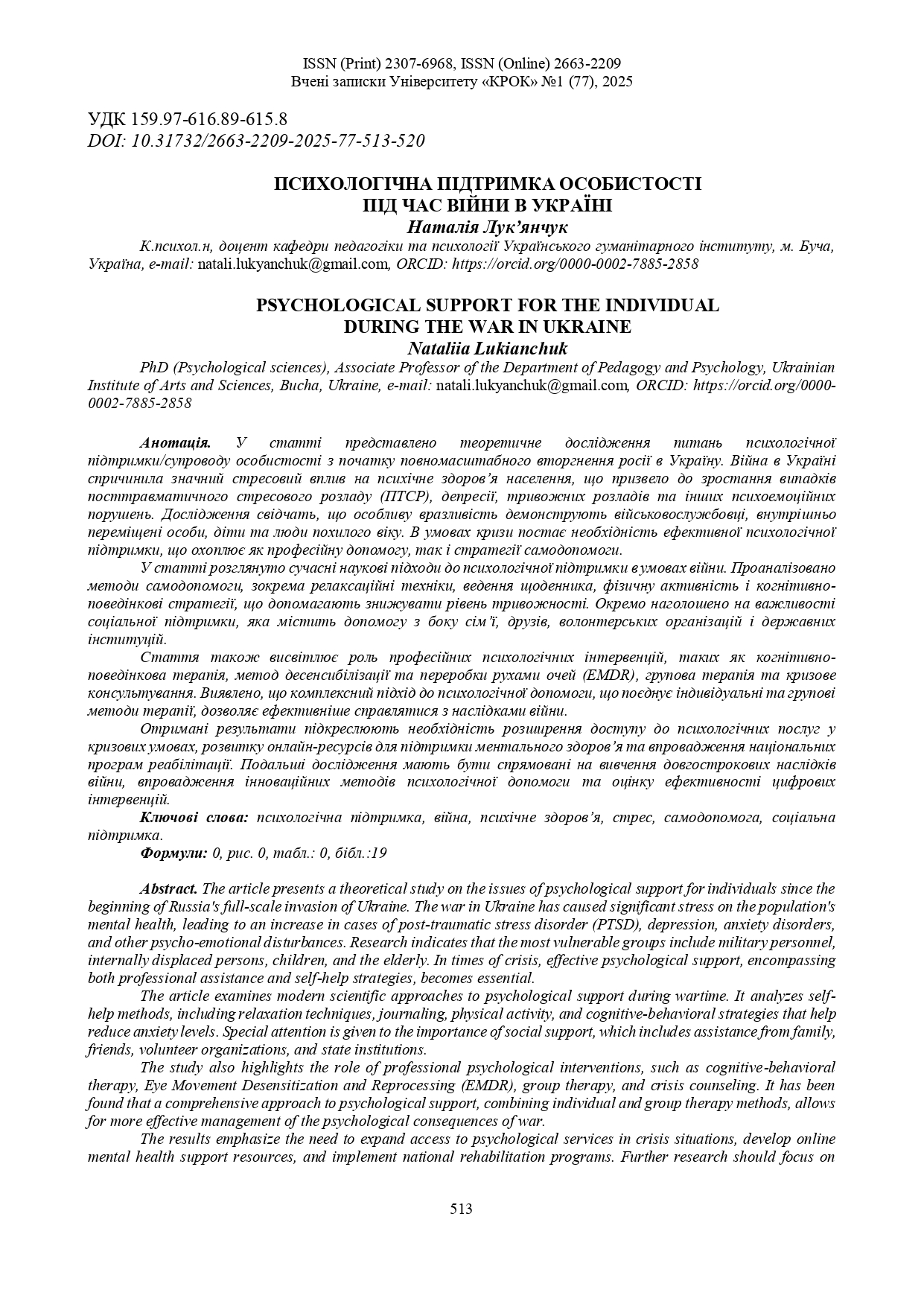PSYCHOLOGICAL SUPPORT FOR THE INDIVIDUAL DURING THE WAR IN UKRAINE
DOI:
https://doi.org/10.31732/2663-2209-2025-77-513-520Keywords:
psychological support, war, mental health, stress, self-help, social supportAbstract
The article presents a theoretical study on the issues of psychological support for individuals since the beginning of Russia's full-scale invasion of Ukraine. The war in Ukraine has caused significant stress on the population's mental health, leading to an increase in cases of post-traumatic stress disorder (PTSD), depression, anxiety disorders, and other psycho-emotional disturbances. Research indicates that the most vulnerable groups include military personnel, internally displaced persons, children, and the elderly. In times of crisis, effective psychological support, encompassing both professional assistance and self-help strategies, becomes essential.
The article examines modern scientific approaches to psychological support during wartime. It analyzes self-help methods, including relaxation techniques, journaling, physical activity, and cognitive-behavioral strategies that help reduce anxiety levels. Special attention is given to the importance of social support, which includes assistance from family, friends, volunteer organizations, and state institutions.
The study also highlights the role of professional psychological interventions, such as cognitive-behavioral therapy, Eye Movement Desensitization and Reprocessing (EMDR), group therapy, and crisis counseling. It has been found that a comprehensive approach to psychological support, combining individual and group therapy methods, allows for more effective management of the psychological consequences of war.
The results emphasize the need to expand access to psychological services in crisis situations, develop online mental health support resources, and implement national rehabilitation programs. Further research should focus on studying the long-term effects of war, implementing innovative psychological support methods, and evaluating the effectiveness of digital interventions.
Downloads
References
Зеленська, К. О. (2023). Персоніфікована система терапії стрес-асоційованих розладів у осіб, які постраждали від бойових дій. Психіатрія, наркологія та медична психологія, 92(2). https://doi.org/10.35339/msz.2023.92.2.zel
Мазурик, А. М. (2024). Психологічна стійкість ветеранів війни. Журнал військової психології, 12(1), 45–60.
Марценковський, Д., Шевлін, М., Бен-Езра, М., Бонджерс, К., Фокс, Р., Караціас, Т., Марценковська, І., Марценковський, І., Пфайффер, Е., Заксер, С., Вальєр, Ф., & Хайленд, Ф. (2023). Психічне здоров'я в Україні у 2023 році. Eur Psychiatry, 67(1) : e27. doi: 10.1192/j.eurpsy.2024.12.
Савиченко, О., Горбачова, О., & Шуневич, Є. (2024). Динаміка психічного здоров’я військовослужбовців. Український журнал психології, 15(2), 75–91.
Слабкий, Г. О., Іваць-Чабіна, А. Р., Чірпак, В. З. (2023). Вплив війни на психічне здоров'я в Україні. Public Health Journal, 10(4), 112–130.
Слободяник, Н. В. (2024). Стресостійкість як психологічний ресурс особистості в ситуації змін. Вчені записки ТНУ імені В. І. Вернадського. Серія: Психологія, Том 35 (74), 4, 91–95.
Яцина, О. (2024). Психологічні реакції дітей та підлітків на війну. Вісник психології Ужгородського національного університету, 9(3), 33–50.
Blekas, A., Steele, M. M., Jones, R. J., et al. (2023). War and Mental Health: The Long-Term Psychological Consequences of Conflict. Journal of Traumatic Stress, 36(4), 654–667.
Ehlers, A., Clark, D. M., & Hackmann, A. (2024). Cognitive therapy for PTSD: A review of recent findings. Journal of Trauma & Dissociation, 25(2), 123–140.
Hobfoll, S. E. (2023). Social support and resilience in crisis situations. American Journal of Community Psychology, 51(4), 215–230.
Jones, L., Patel, N., & Steele, B. (2020). Long-term consequences of war trauma on children. Child Development, 91(1), 37–50.
Jones, R. J., Patel, R. V., & Steele, M. M. (2020). Child Trauma and War: Understanding Psychological Responses in Youth. Child Development Perspectives, 14(3), 230–242.
Frounfelker, R. L., Li, Z., Miconi, D., & Betancourt, T. S. (2019). Trauma and resilience in war-affected children. Clinical Child and Family Psychology Review, 22(3), 273–289.
Mollica, R. F., Steele, M. M., & Patel, R. V. (2022). Psychological Interventions in War Zones: Addressing Trauma and Promoting Recovery. Global Mental Health, 9, 27.
Patel, R. V., Weine, S. M., & Frounfelker, R. L. (2021). Mental Health in Refugee Populations: Addressing the Consequences of Displacement and War. Lancet Psychiatry, 8(6), 510–524.
Reuters. (2025, February 20). Emotional trauma piles up in Ukraine’s children three years after invasion. Retrieved from https://www.reuters.com
Shapiro, F. (2023). Eye movement desensitization and reprocessing (EMDR) therapy: Research and practice. Clinical Psychology Review, 92, 101–120.
Steele, M. M., Weine, S. M., Patel, R. V., et al. (2021). Post-Traumatic Stress and Depression in War-Affected Populations: A Global Perspective. World Psychiatry, 20(2), 205–212.
Thapa, S. B., Steele, M. M., & Jones, R. J. (2022). The Role of Social Support in Managing War-Induced Mental Health Challenges. Social Psychiatry and Psychiatric Epidemiology, 57(8), 1179 –1190.

Downloads
Published
How to Cite
Issue
Section
License

This work is licensed under a Creative Commons Attribution-NonCommercial 4.0 International License.

